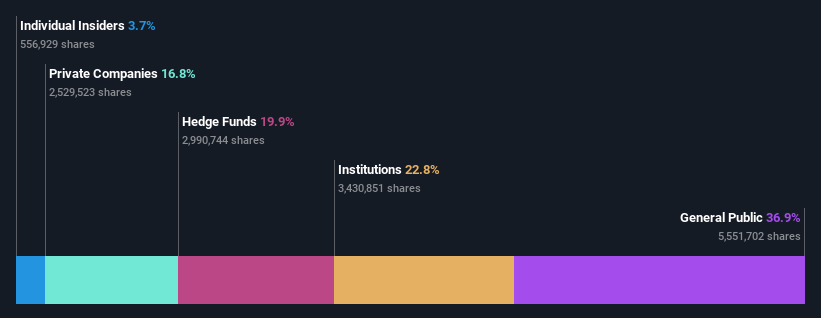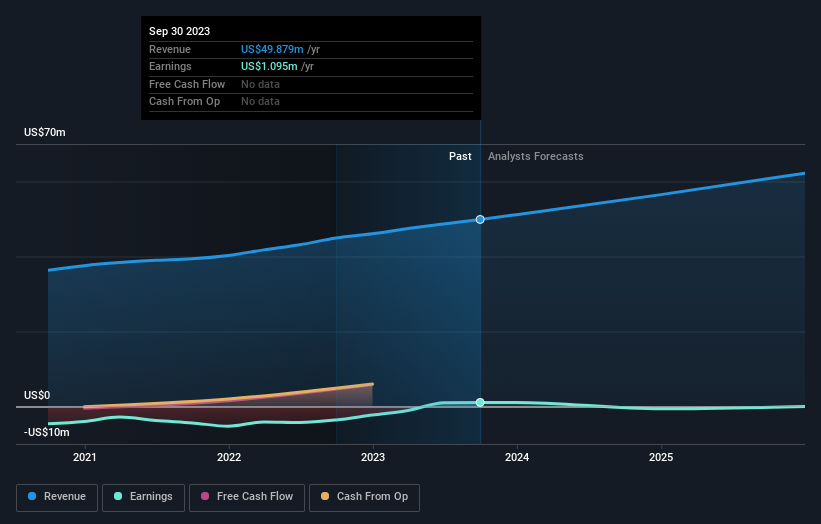RADCOM Ltd. (NASDAQ:RDCM) most popular amongst retail investors who own 37% of the shares, institutions hold 23%
Key Insights
The considerable ownership by retail investors in RADCOM indicates that they collectively have a greater say in management and business strategy
A total of 5 investors have a majority stake in the company with 50% ownership
If you want to know who really controls RADCOM Ltd. (NASDAQ:RDCM), then you'll have to look at the makeup of its share registry. The group holding the most number of shares in the company, around 37% to be precise, is retail investors. In other words, the group stands to gain the most (or lose the most) from their investment into the company.
And institutions on the other hand have a 23% ownership in the company. Institutions often own shares in more established companies, while it's not unusual to see insiders own a fair bit of smaller companies.
In the chart below, we zoom in on the different ownership groups of RADCOM.
Check out our latest analysis for RADCOM
What Does The Institutional Ownership Tell Us About RADCOM?
Institutional investors commonly compare their own returns to the returns of a commonly followed index. So they generally do consider buying larger companies that are included in the relevant benchmark index.
RADCOM already has institutions on the share registry. Indeed, they own a respectable stake in the company. This suggests some credibility amongst professional investors. But we can't rely on that fact alone since institutions make bad investments sometimes, just like everyone does. It is not uncommon to see a big share price drop if two large institutional investors try to sell out of a stock at the same time. So it is worth checking the past earnings trajectory of RADCOM, (below). Of course, keep in mind that there are other factors to consider, too.
It would appear that 20% of RADCOM shares are controlled by hedge funds. That worth noting, since hedge funds are often quite active investors, who may try to influence management. Many want to see value creation (and a higher share price) in the short term or medium term. Estate of Zohar Zisapel is currently the company's largest shareholder with 17% of shares outstanding. With 15% and 8.5% of the shares outstanding respectively, Lynrock Lake LP and Yelin Lapidot Holdings Ltd. are the second and third largest shareholders. Additionally, the company's CEO Eyal Harari directly holds 1.1% of the total shares outstanding.
Our research also brought to light the fact that roughly 50% of the company is controlled by the top 5 shareholders suggesting that these owners wield significant influence on the business.
While it makes sense to study institutional ownership data for a company, it also makes sense to study analyst sentiments to know which way the wind is blowing. There is some analyst coverage of the stock, but it could still become more well known, with time.
Insider Ownership Of RADCOM
The definition of company insiders can be subjective and does vary between jurisdictions. Our data reflects individual insiders, capturing board members at the very least. Management ultimately answers to the board. However, it is not uncommon for managers to be executive board members, especially if they are a founder or the CEO.
Insider ownership is positive when it signals leadership are thinking like the true owners of the company. However, high insider ownership can also give immense power to a small group within the company. This can be negative in some circumstances.
Shareholders would probably be interested to learn that insiders own shares in RADCOM Ltd.. As individuals, the insiders collectively own US$4.4m worth of the US$120m company. This shows at least some alignment, but we usually like to see larger insider holdings. You can click here to see if those insiders have been buying or selling.
General Public Ownership
The general public-- including retail investors -- own 37% stake in the company, and hence can't easily be ignored. While this group can't necessarily call the shots, it can certainly have a real influence on how the company is run.
Private Company Ownership
We can see that Private Companies own 17%, of the shares on issue. Private companies may be related parties. Sometimes insiders have an interest in a public company through a holding in a private company, rather than in their own capacity as an individual. While it's hard to draw any broad stroke conclusions, it is worth noting as an area for further research.
Next Steps:
While it is well worth considering the different groups that own a company, there are other factors that are even more important. To that end, you should learn about the 2 warning signs we've spotted with RADCOM (including 1 which is concerning) .
Ultimately the future is most important. You can access this free report on analyst forecasts for the company.
NB: Figures in this article are calculated using data from the last twelve months, which refer to the 12-month period ending on the last date of the month the financial statement is dated. This may not be consistent with full year annual report figures.
Have feedback on this article? Concerned about the content? Get in touch with us directly. Alternatively, email editorial-team (at) simplywallst.com.
This article by Simply Wall St is general in nature. We provide commentary based on historical data and analyst forecasts only using an unbiased methodology and our articles are not intended to be financial advice. It does not constitute a recommendation to buy or sell any stock, and does not take account of your objectives, or your financial situation. We aim to bring you long-term focused analysis driven by fundamental data. Note that our analysis may not factor in the latest price-sensitive company announcements or qualitative material. Simply Wall St has no position in any stocks mentioned.


